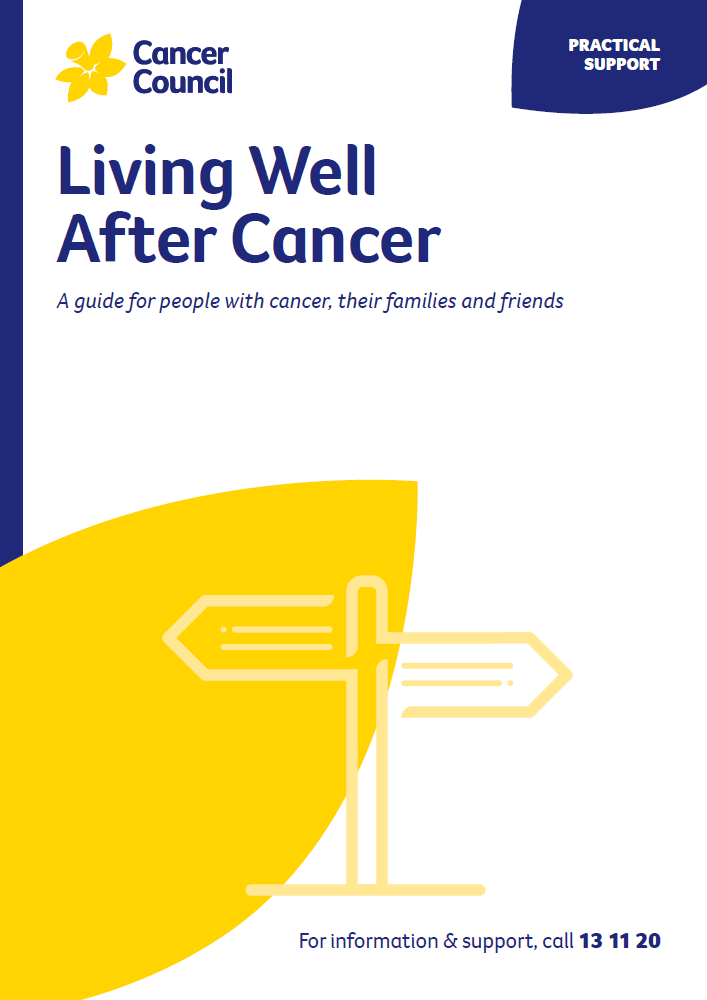- Home
- Bowel cancer
- Life after treatment
Life after treatment for bowel cancer
For most people, the cancer experience doesn’t end on the last day of treatment. Life after cancer treatment can present its own challenges. You may have mixed feelings when treatment ends, and worry that every ache and pain means the cancer is coming back.
Learn more about:
- Overview
- Follow-up appointments
- Dealing with feelings of sadness
- Looking after yourself
- If bowel cancer returns
Overview
Some people say that they feel pressure to return to “normal life”. It is important to allow yourself time to adjust to the physical and emotional changes, and establish a new daily routine at your own pace. Your family and friends may also need time to adjust.
Cancer Council 13 11 20 can help you connect with other people who have had bowel cancer, and provide you with information about the emotional and practical aspects of living well after cancer.
For more on this, see Living well after cancer.
Follow-up appointments
After treatment ends, you will have regular appointments to monitor your health, manage any long-term side effects and check that the cancer hasn’t come back or spread. Check-ups have been found to improve outcomes after surgery for bowel cancer. You will usually have a physical examination and you may have blood tests (including checking CEA levels), scans and colonoscopies.
How often you need to see your doctor will depend on the level of monitoring needed for the type and stage of the cancer. Talk to your doctor about how often you need to have check-ups or colonoscopies. Check-ups will become less frequent if you have no further problems. Between follow-up appointments, let your doctor know immediately of any symptoms or health problems. Don’t wait for your next appointment.
Dealing with feelings of sadness
If you have continued feelings of sadness, have trouble getting up in the morning or have lost motivation to do things that previously gave you pleasure, you may be experiencing depression. This is quite common among people who have had cancer.
Talk to your GP, because counselling or medication – even for a short time – may help. Some people can get a Medicare rebate for sessions with a psychologist. Cancer Council may also run a counselling program in your area.
For information about coping with depression and anxiety, call Beyond Blue on 1300 22 4636. For 24-hour crisis support, call Lifeline 13 11 14.
Cancer webinars
Watch our cancer webinars for information and insights that can help with the challenges you may face now that treatment is finished.
Looking after yourself
Cancer can cause physical and emotional strain, so it’s important to look after your wellbeing. Cancer Council has free booklets and programs to help you during and after treatment.
Call 13 11 20 to find out more, or see Managing cancer side effects, Exercise after a cancer diagnosis, Complementary therapies, Emotions and cancer, Nutrition and cancer, Sexuality, intimacy and cancer, Fertility and cancer, LGBTQI+ people and cancer and Living well after cancer.
Alternative therapies are therapies used instead of conventional medical treatments. These are unlikely to be scientifically tested, may prevent successful treatment of the cancer and can be harmful. Cancer Council does not recommend the use of alternative therapies as a cancer treatment.
If bowel cancer returns
For some people, bowel cancer does come back after treatment, which is known as a recurrence. It is important to have regular check-ups so that if cancer does come back, it can be found early.
If the recurrence is confined to the bowel and nearby lymph nodes, you may be able to have surgery to remove the cancer.
If bowel cancer has spread beyond the bowel (advanced or metastatic bowel cancer), you may be offered treatment, such as surgery, chemotherapy, targeted therapy, immunotherapy or radiation therapy. These treatments may remove the cancer, help control its growth and relieve symptoms. If your bowel becomes blocked, you will need urgent treatment.
Watch this video to see why eating well is so important after a cancer diagnosis, and what you can do to maintain a healthy diet.
Research shows that exercise benefits people with cancer during and after treatment. Find out more in this video or see our other exercise videos.
More resources
A/Prof David A Clark, Senior Colorectal Surgeon, Royal Brisbane and Women’s Hospital, QLD, The University of Queensland and The University of Sydney; Yvette Adams, Consumer; Dr Cameron Bell, Gastroenterologist, Royal North Shore Hospital, NSW; Katie Benton, Advanced Dietitian Cancer Care, Sunshine Coast University Hospital and Queensland Health, QLD; John Clements, Consumer; Dr Fiona Day, Medical Oncologist, Calvary Mater Newcastle, NSW; Alana Fitzgibbon, Clinical Nurse Consultant, GastroIntestinal Cancers, Cancer Services, Royal Hobart Hospital, TAS; Prof Alexander Heriot, Consultant Colorectal Surgeon, Director Cancer Surgery, Peter MacCallum Cancer Centre, and Director, Lower GI Tumour Stream, Victorian Comprehensive Cancer Centre, VIC; Caitriona Nienaber, 13 11 20 Consultant, Cancer Council WA; Dr Kirsten van Gysen, Radiation Oncologist, Nepean Cancer Care Centre, NSW.
View the Cancer Council NSW editorial policy.
View all publications or call 13 11 20 for free printed copies.

